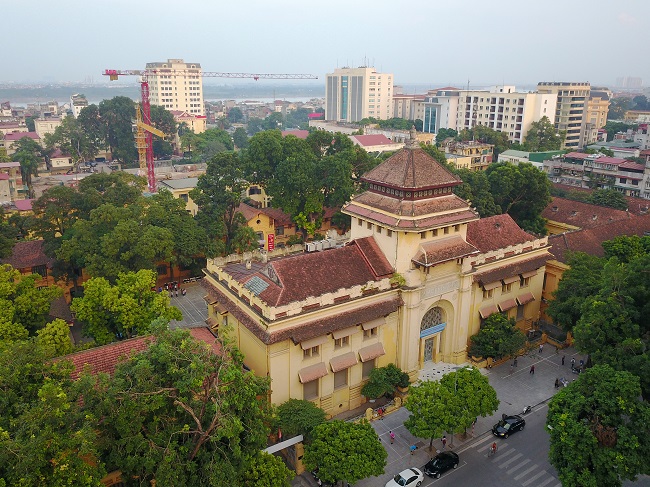
The building at 19 Le Thanh Tong Street, Hoan Kiem District - a campus of Hanoi National University.
As a leading educational institution in Vietnam, in recent years, Vietnam National University, Hanoi (VNU) has implemented many new policies to promote innovation in teaching and research, participate in many major national science and technology projects, and expand cooperative relationships with many prestigious universities worldwide. VNU's academic reputation and training quality have been recognized by numerous Asian and global ranking organizations. Most recently, in the QS World University Rankings 2021 (QS WUR 2021), announced on June 10, 2020, VNU ranked in the 801-1000 group of the best universities globally for the third consecutive year.
Leading the way in innovating teaching methods at the undergraduate and postgraduate levels.
During the first two years of its term (2015, 2016), Vietnam National University, Hanoi (VNU) successfully organized the entrance examination using a competency-based assessment method, which was highly appreciated by society. Since 2017, this model has been transferred to the Ministry of Education and Training for use in the national high school graduation examination. Along with utilizing the results of this examination, to improve the quality and quantity of incoming students, VNU has developed assessment science, innovated other admission methods for undergraduate and postgraduate programs, and reformed the entire measurement and evaluation system in its training activities.
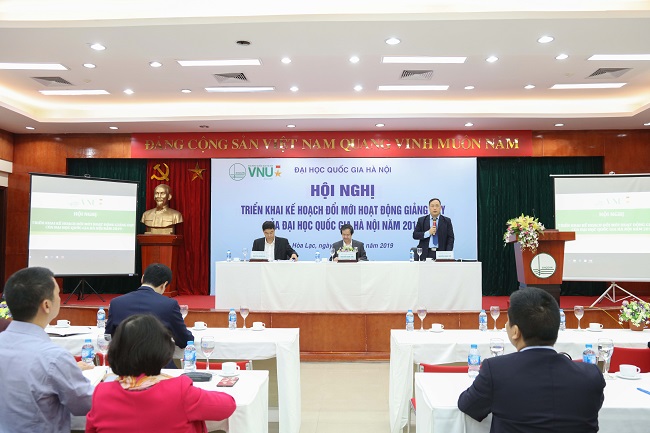
The conference to implement the plan for innovation in teaching activities of Vietnam National University, Hanoi was held in 2019.
The development and reform of training programs, focusing on output-oriented approaches, aligns with global trends while meeting the demand for high-quality, highly skilled human resources to serve the socio-economic development of the country. To date, 100% of VNU's training programs are built on clearly defined objectives and output standards. Furthermore, the training programs are reformed to ensure both fundamental knowledge and creative abilities, while also enhancing practical training, internships, and real-world experience, closely linked to the needs of society. The content and methods of training support the development of individual talent and promote entrepreneurial capacity, meeting the competency standards for job positions in businesses and employers.
The structure of training programs has been adjusted more rationally. Vietnam National University, Hanoi (VNU) is a pioneer in the country in implementing the planning (in 2014) and stratifying training programs (in 2015). This is an important direction for opening new majors and specializations at VNU. In the context of the rapid and continuous changes in society and the labor market, VNU has quickly adapted to regularly adjust and supplement its planning to suit practical requirements.
From 2015 to the present, the structure of training programs has shifted to adapt to the Fourth Industrial Revolution, increasing applicability and the potential for entrepreneurship and innovation. Specifically: the proportion of training programs in the fields of natural sciences, medicine, and life sciences has shifted from 36% (in 2015) to a smaller proportion of 16% (in 2019); the technology and engineering group: from only 9% in 2015, it increased to 18% in 2019. Notably, the strong areas of interdisciplinary science and technology at Vietnam National University, Hanoi, have also seen a significant shift: from 5% in 2015 to 15% in 2019.
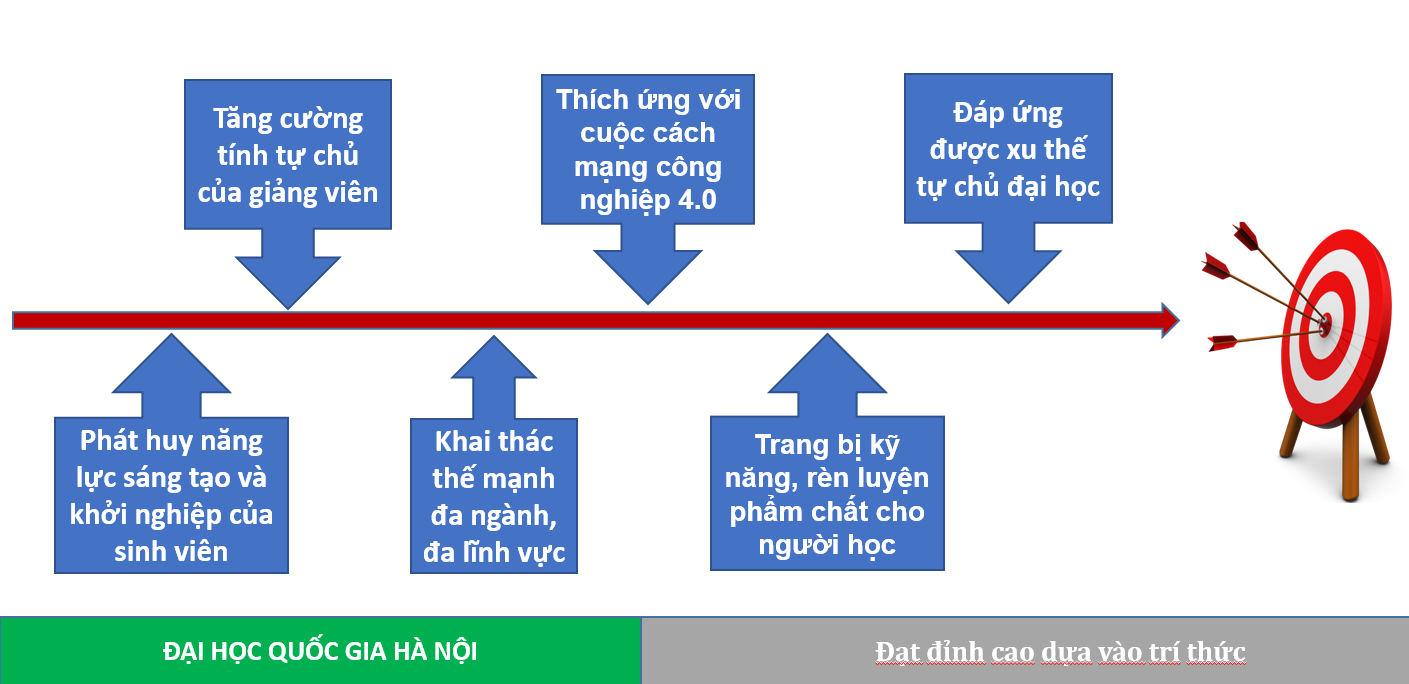
To meet the demand for high-quality human resources for the country's socio-economic development, Vietnam National University, Hanoi (VNU) has made innovations in its thinking, shifting from maintaining a stable scale (24,000 students in 2015) to gradually increasing its scale (over 35,000 students in 2019), mainly through new interdisciplinary, cutting-edge training programs and engineering, technology, and new scientific fields with high entrepreneurial potential where society has a high demand for human resources.
The consistent policy of Vietnam National University, Hanoi (VNU) is to increase the overall scale of training while maintaining quality, focusing on both development and high-quality, high-level training.
The Vietnam National University, Hanoi (VNU) has fulfilled its national responsibility in training high-quality human resources for the country. Each year, VNU provides over 5,000 bachelors, thousands of masters, and hundreds of doctoral graduates, including lecturers for universities nationwide, and approximately 1,000 bachelors from its talent, advanced, and high-quality training programs. In addition, VNU has provided the Party and State with many research and theoretical dissemination cadres at the undergraduate and postgraduate levels.
Doctoral and postgraduate training has always been a priority for Vietnam National University, Hanoi (VNU). Many VNU graduates have been accepted into postdoctoral research programs at prestigious universities and research centers worldwide. Doctoral training activities have also contributed to increasing the quantity and quality of international publications and maintaining VNU's position in regional and international rankings. Particularly in the natural sciences, engineering, and technology fields at VNU, 90% of doctoral students have published internationally in ISI/Scopus journals.
Pioneering innovation in teaching methods towards "individualization".
With a learner-centered approach, promoting the active role of learners and motivating them to participate actively in improving the quality of education, numerous conferences, workshops, seminars, forums, and training sessions on innovative teaching methods have been organized. The Center for Teaching Support under the Institute for Educational Quality Assurance has been established and has effectively supported the innovation of teaching and learning methods at Vietnam National University, Hanoi. Teaching activities at Vietnam National University, Hanoi are implemented based on the innovation of the training philosophy and the learning outcomes of the training programs, maximizing the capabilities of each individual, on the foundation of advanced teaching technologies, digital learning materials, and modern information technology infrastructure.

Individualization in teaching and learning – an effective approach to unlocking learners' potential – is being implemented by Vietnam National University, Hanoi (VNU) and is showing initial positive results.
The innovation in teaching general subjects, implemented under the Project on "Innovating the Management of Training for General Courses at Vietnam National University, Hanoi," has facilitated students' selection of subjects according to their schedules and timeframes. The Project "Innovating Internships and Practical Training to Enhance Student Employability at Vietnam National University, Hanoi" is implemented by having students undertake internships in local areas and businesses; promoting early access to the professional requirements of the labor market and improving their job prospects after graduation. The implementation of individualized education is only the first step, but it represents a promising direction at Vietnam National University, Hanoi.
Using scientific research as the foundation
The focus is on improving the overall quality of education and training, developing the qualities, vision, abilities, and skills of learners. Accordingly, along with innovating teaching methods and increasing practical application to enhance learners' capabilities, organizing supplementary activities to develop learners' qualities, vision, and skills is also given special attention.
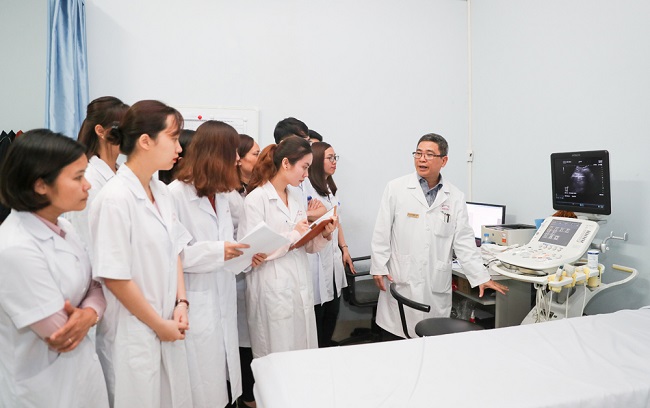
Furthermore, Vietnam National University, Hanoi (VNU) has consistently pursued a philosophy of developing high-quality, elite education, not focusing on quantity. For many years, VNU has maintained a reasonable scale of regular training to improve the quality of education. As a result, the ratio of regular students to lecturers is 15:1 - the highest among Vietnamese universities. The proportion of postgraduate students accounts for nearly 30% of the total number of regular students and trainees.
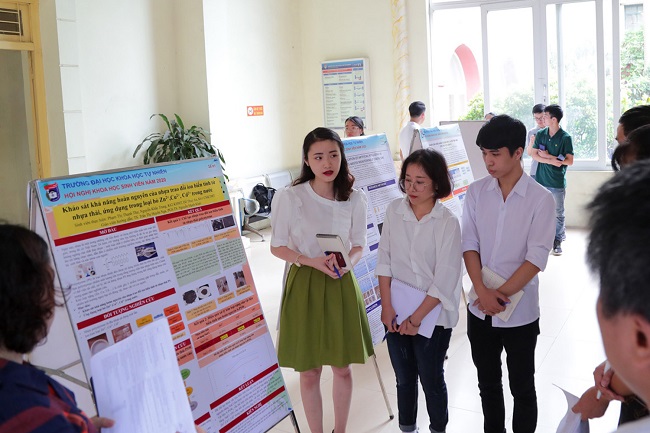
Students from Vietnam National University, Hanoi conduct scientific research.
Building upon the tradition of leading national training and scientific research of Hanoi University, and maximizing autonomy and accountability, Vietnam National University, Hanoi (VNU) has developed a university that closely integrates training with scientific research according to the model of an advanced research university, linking training with and through research. Professor Vu Minh Giang (senior expert, former Vice Director of VNU) shared his perspective: “VNU considers scientific research as an indicator of training quality. Regulations on scientific research and other policies of VNU encourage and create mechanisms for all levels of education to be deeply immersed in the scientific research environment. Students, graduate students, and postgraduate researchers participating in research with faculty members is very common at VNU.” Scientific research has also laid the groundwork for VNU to develop new majors and specializations not yet included in the State's training catalog, creating a unique and pioneering characteristic of VNU, such as the specializations in nanomaterials and components, climate change, and sustainable science…
Emphasis is placed on closely integrating scientific research with training, and research-based training, to improve the quality of education and the creative capacity of learners according to international standards. The selection of scientific and technological projects and topics related to master's and doctoral training will continue to be reformed. Learners will be provided with practical experience and application skills through laboratory exercises, simulations, and workshops; encouraged to participate in science clubs, scientific seminars, and faculty presentations; and given opportunities to participate in field surveys, scientific experiments, thesis writing, research projects, and the application of scientific advancements in practice within the scientific research programs of faculty members, departments, and the university, as well as within the framework of subject-specific teaching activities. The results of scientific research will be used to serve and improve the quality of teaching and develop new training programs.
Author:Thuy Duong - VNU Media
Newer news
Older news